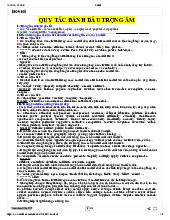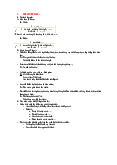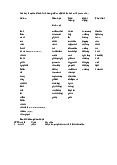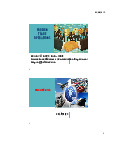









Preview text:
ĐỀ CƯƠNG ÔN TẬP GIỮA KÌ 2 MÔN TIẾNG ANH 7
UNIT 6 | GIÁO DỤC I/ Từ vựng: Bài 1:
bài luận (n) / tiếng anh ˈ / bài tiểu luận ɪ
bài tập về nhà (n) / ho ˈ mw ʊ rk/ bài tập về nhà ɜː
trình bày (danh từ) / giá ˌ zn ː tôi ˈ n/ buổi thuyt trnh, b ɪʃ ài thuyt trnh
hiện tại (v) /pr ɪˈ zent/ trnh bày,thuyt trnh
dự án (n) / quan hệ ngày ˈ ɒ ekt/ dự án, đồ án ʒ báo cáo (n) /r ɪˈ ɔː P rt/báo cáo báo cáo (v) /r ɪˈ ɔː P rt/ report, Magic
test (n) /test/ bài kiểm tra
test (v) /test/ kiểm tra, thử nghiệm Bài 2:
bực mình (adj) /ə N d/ khó chịu bội, khó chịu ˈ ɔɪ
khó chịu (adj) /ə N
ˈ ɔɪɪ η/ gây bội bội, khó chịu
làm phiền (v) /ə'n ɔɪ/ quấy rầy, làm phiền
vui mừng (adj) /dɪˈ laɪ tɪ d/vui mừng, hài lòng
thích thú (n) /d ɪˈ laɪ t/ niềmvui
thất vọng (adj) / ngày səˌ Pɪ không ˈ ɔɪ ɪ d/thất vọng
thất vọng (adj) / ngày səˌ Pɪ không
ˈ ɔɪ ɪ η/gây thất vọng
làm thất vọng (v) / ngày ˌ ɪ səˈ P
ɔɪ nt/ doing cho ai thất vọng
sự thất vọng (n) / ngày
ˌ ɪ səˈ Pɔɪ ntmənt/ sự thất vọng
thất bại (động từ) /fe l/ thi r:t, thất bại ɪ
vượt qua (v) /pæs/ thi đâ bạn =
vui mừng (adj) /pli zd ː / hài lòng
làm hài lòng (adj) / thêm ˈ z
ː η/ dễ chịu, mang lại niềm vui thích ɪ
please (v) /pli:z/ làm hài lòng
ngạc nhiên (adj) /sər thực t ˈ ế zd/ Ngạc nhiên ɪ
ngạc nhiên (adj) /sər thực t ˈ ế z ɪ η/ gây Ngạc nhiên ɪ
ngạc nhiên (n) /sər thực t ˈ ế z/ sự Ngạc nhiên ɪ
ngạc nhiên (v) /sər thực t
ˈ ế z/ làm ai đó Ngạc nhiên ɪ buồn bực (adj) / P
ˌʌ set/ buồn bã, đau khổ ˈ
làm buồn lòng (v) / P set/ làm ai đó buồn phiền, đau khổ ˌʌ ˈ
làm buồn lòng (n) / pset/ sự ʌ
buồn phiền, sự đau khổ
làm buồn lòng (adj) / P bộ
ˌʌ η/ gây phiền muộn, đau đ ˈ ɪ ớn Bài 3:
ở nước ngoài (adj) /ə anh ˈ ɔː d/ở/ra nư:c ngoài
mặc dù (liên hợp) / tôi L ɔː À ˈ Mʊ /mặc dù
kinh nghiệm (n) / tôi
ɪ ˈ spɪ riəns/ trải nghiệm, trải nghiệm
kinh nghiệm (động từ) / tôi ɪ sp ˈ
riəns/ trải nghiệm điều g ɪ đó
tuy nhiên (adv) /ha evər/ tuy nhiên, tuy nhiên ʊˈ
cô đơn (tính từ) /ˈ loʊ nli/cô đơn, lẻ loi 1
phủ định (adj) / không ˈ ət ɡ ɪv/ tiêu cực, xấu
tích cực (adj) /ˈ Pɒ zətɪ v/tích cực, tốt II/ Ngữ pháp:
Phải/không cần (Phải/không cần phải):
– Cấu hình must + infinitive use để nói đn một nhiệm vụ hoặc một nghĩa vụ được người khác
giao cho mnh (ví dụ: Đấu theo pháp luật hoặc các nội quy, quy định của trường học, cơ quan).
Ví dụ: Chúng ta dừng lại khi đ phải èn chuyển sang đỏ. Cô ấy
hoàn thành bài luận của m phải
ình trước thứ Hai tuần tới.
– Trong cấu trúc phải , có một từ thông thường. V th khi sử dụng must be formatover format,
ta thêm thì không . Cấu hình do not + Have to + infinitive dùng để trình bàytả một hành động không bắt được
buộc, có thể thực hiện hoặc không.
ví dụ hôm nay tôi lau bảng. không phải Anh ấy thuy không phải
ết trình trong lớp Khoa học.
Because / Because of (bởi vì):
– Bởi : bởi v (dùng để mô tả nguyên nhân) vì Công thức Ví dụ
Bởi vì + mệnh đề 1 , mệnh đề 2. - V cô ấy tốt bụng ì
nên cô ấy luôn giúp đỡ mọi người.
Mệnh đề 1 + vì + mệnh đề 2.
- Cô ấy luôn giúp đỡ người khác vì cô ấy tốt bụng.
– Because of : bởi v ai/điều g (dùng để mô tả nguyên nhân) Công thức Ví dụ
Bởi vì + N/V-ing , mệnh đề.
- Vì anh ấy có tính cách
tốt nên mọi người đều thích anh ấy.
Mệnh đề + vì + N/V-ing.
- Mọi người đều thích anh ấy vì tính cách tốt của anh ấy.
Vậy / thực sự:
Các từ nhấn mạnh so và really được dùng để nhấn mạnh các tính từ hoặc trạng từ theo sau nó.
– so được dùng để thể hiện sự bất ngờ về một việc được nhiều hơn mong đợi của mnh.
e.g. I’m so happy because I have an A for my English test. I did the test really well.
– really được dùng để nhấn mạnh cho tính từ hoặc một số động từ; really có tác dụng mạnh hơn very.
e.g. He’s really disappointed because he failed the test. He did the test so badly.
However (tuy nhiên) / Although (mặc dù): 2
– Để nối hai mệnh đề có ý đối lập nhau, ta dùng however hoặc although. Mệnh đề sau however
và although diễn tả một sự việc trái ngược v:i mệnh đề còn lại.
e.g. I studied a lot. I failed the final exam.
I studied a lot. However, I failed the final exam. (hoặc)
Although I studied a lot, I failed the final exam.
– however và although thường được dùng trong văn vit và ít dùng trong các hội thoại hằng ngày.
Việc sử dụng các liên từ trong đoạn văn giúp người đọc có thể hiểu được đoạn văn dễ dàng hơn. * Chú ý:
– Khi however đứng đầu câu, sử dụng dấu phẩy (,) ngay sau however để ngăn cách v:i mệnh đề phía sau.
– Sử dụng dấu phẩy giữa hai mệnh đề trong câu bắt đầu v:i (không dùng dấu phẩy although ngay sau ). although UNIT 7 | TRANSPORTATION I/ Vocabulary: Lesson 1:
backpack (n) / bækpæk/ ba lô ˈ boarding pass (n) / b ˈ ɔːrd ŋ pæs/ thẻ lên ɪ máy bay/tàu baggage claim (n) / bæ ˈ
ɡɪdʒ kle m/ khu vực lấy hành lý (ở sân bay) ɪ customs (n) / k ˈ stəmz/ hải quan ʌ luggage (n) / l ˈ d ʌɡɪ / hành lý ʒ
passport (n) /ˈpæspɔːrt/ hô = chiu suitcase (n) / su ˈ tke ː s/ va-li ɪ Lesson 2: comfortable (adj) / k ˈ
mftəbl/ thoải mái, dễ chịu ʌ comfort (n) / k ˈ
mfət/ sự thoải mái, dễ chịu ʌ comfort (v) / k ˈ mfət/ dỗ dành, an ủi ʌ
convenient (adj) /kən vi ˈ njənt/ tiện lợi ː
convenience (n) /kən vi ˈ njəns/ sự tiện lợi ː
eco-friendly (adj) /ˌi ko ː
ʊ frendli/ thân thiện v:i môi trường ˈ
frequent (adj) /ˈfri kwənt/ ː
thường xuyên, hay xảy ra local (n) / lo ˈ kl/ ʊ
dân địa phương, người bản địa local (n) /ˈlo kl/ ʊ thuộc về địa phương public (adj) / p ˈ bl ʌ k/ ɪ công cô =ng public (n) /ˈp bl ʌ k/ công chúng, quần chúng ɪ publicize (v) / p ˈ bl ʌ sa ɪ z ɪ / công khai reliable (adj) /r la ɪˈ əbl/ ɪ có thể tin tưởng rely (v) /r la ɪˈ
/ɪ tin cậy, trông cậy (+on/upon somebody/something) 3 subway (n) / s ˈ bwe ʌ
/ɪ tàu điện ngầm (US, thường dùng v:i mạo từ the)
underground (n) /ˌʌndər ra ˈɡ
nd/ tàu điện ngầm (UK, thường dùng v ʊ :i mạo từ the) ticket (n) / t ˈ k ɪ t/ vé ɪ
transportation (n) / trænspər ˌ te ˈ n/ phương tiện giao ɪʃ thông Lesson 3: electronic (adj) / lek ɪˌ tr ˈ ɒn k/ (thuộc) điện ɪ tử evidence (n) / ev ˈ
dəns/ bằng chứng, dẫn chứng ɪ hover (v) / h ˈ vər/ ʌ lơ lửng II/ Grammar:
Ordering adjectives (trật tự của tính từ): Ý Kích Hình Tuổi Màu Nguồn Chất Mục kiến cỡ dạng sắc gốc liệu đích pretty, small, chubby, Vietnamese, beautiful, orange, cooking, smart, little, big, young, thin, skinny, yellow, Japanese, wooden, silk, running, large, old, new, slim, fat Chinese, metal, easy, blue, white, writing, medium- … square, American, leather,… difficult,… … reading,… sized,… round,… …
e.g. a small new white handbag a new white silk dress
a pretty round reading glasses
an old American leather backpack
Possessive pronouns (đại từ sở hữu):
Dùng đại từ sở hữu khi không muốn lặp lại danh từ đã được đề cập trư:c đó. Possessive adjectives Possessive pronouns Ví dụ (Tính từ sở hữu)
(Đại từ sở hữu) Thay v nói: my mine Is that book your book? Ta nói: your yours Is that book yours? our ours Thay v nói:
Their teacher is Australian. Ou their theirs r teacher is American. Ta nói: his his
Their teacher is Australian. Ou her hers rs is American. 4 its its
Lưu ý: Tính từ sở hữu luôn có danh từ theo sau; đại từ sở hữu không có danh từ theo sau.
Cấu trúc so sánh as…as…:
– Dùng as + adjective + as để so sánh hai đối tượng/chủ thể giống nhau hoặc bằng nhau.
Subject 1 + be + as + adjective + as + Subject 2.
e.g. Subway tickets are as expensive as train tickets.
– Dùng not as + adjective +as để so sánh hai đối tượng/chủ thể không giống nhau hoặc không bằng nhau.
Subject 1 + be + not + as + adjective + as + Subject 2.
e.g. Buses are not as fast as trains. (Trains are faster than buses .) PRACTICE UNIT 6 | EDUCATION I/ PRONUNCIATION
A. Choose the word whose underlined part differs from the other three in pronunciation in
each of the following questions. 1. A. before B. report C. homework D. uniform 2. A. abroad B. negative C. pass D. annoyed
B. Choose the word that differs from the other three in the position of the main stress in
each of the following questions. 3. A. essay B. classmate C. project D. report 4. A. difficult B. however C. positive D. chemistry
II/ VOCABULARY AND GRAMMAR
Choose the best option (A, B, C or D) to complete each of the following questions.
5. Sammy studied really hard, so she __________ all of her tests. A. passed B. failed C. got D. did
6. My teacher told us to do a ____ about climate change. We have to speak about this topic in front of the class. 5 A. test B. presentation C. exercise D. homework
7. Student A: How’s the course going?
Student B: I’m __________ enjoying it. A. very B. much C. really D. a lot
8. The math exercise is too easy for her. She _____ ask for help. A. didn't had to B. didn't have to C. doesn't have to D. don't have to
9. Nick got 100% on his physics test. His twin brother, Adam, ______, had to retake the test. A. although B. but C. so D. however
10. I’m really __________ with Nick. We have an important biology project, but he doesn’t do his part. A. hopeful B. annoyed C. pleased D. excited
11. I felt tired ____ I studied for hours to prepare for the final. A. although B. because C. so D. and
12. I got high scores in the final exam. I feel extremely ____. A. disappointed B. upset C. delighted D. negative III/ ERROR CORRECTION
Find the underlined part that needs correction in each of the following questions.
13. Tomorrow is Halloween. We has to clean and decorate our class. A B C D
14. He don't have to go to school this Thursday because it's a day-off. A B C D
15. I was late to school this morning because of I missed the bus. A B C D
16. However he had a broken leg, he still went to school. A B C D IV/ WORD FORM
Write the correct form of the given words.
17. In my English class, we have to give _________________(PRESENT) about various topics.
18. Studying abroad puts you into an unfamiliar situation, so you will become more ___________________(DEPEND).
19. Jenny looked ___________________(DISAPPOINT) when she heard that she couldn't go to the concert on Friday. 6
20. I was so _________________(SURPRISE) because I got an A plus on my English test. V/ READING
Read the following passage. For each question, circle the correct option A, B, C, or D that best suits each blank.
Studying abroad is becoming popular for many students looking to learn more about other
languages and countries. Sometimes, students (21)__________ work with an online exchange
organization to make travel arrangements and make sure they have a wonderful and safe experience while away.
Studying abroad is also a (22)__________ way to meet new friends, visit new places, and
experience different things. Students are (23)__________ to learn about new opportunities and
meet people from other cultures. (24)_________ learning in a foreign country can be difficult,
they are pleased when they (25)__________ their first test, complete their first project, or meet
amazing new people. Overall, it’s a great way to travel to other countries and learn more about the world. 21. A. have B. have to C. to have D. has to 22. A. great B. terrible C. pleased D. surprised 23. A. upset B. disappointed C. annoyed D. delighted 24. A. Because B. Although C. However D. So 25. A. present B. fail C. pass D. make VI/ WRITING
A. Put the words in the correct order to make correct sentences.
26. school/ week/ didn't/ Lisa/ go/ headache/ because/ to/ last/ had/ she/ a/.
_________________________________________________________________________
27. with/ feel/ exam/ my/ pleased/ I /results/.
_________________________________________________________________________
28. she/ studied/ failed/ she/ hard,/ the/ Although/ exam/.
_________________________________________________________________________
B. Rewrite the following sentences without changing their meaning. Use the given word(s) if any.
29. Anna’s mother is from China, but she can’t speak Chinese. (HOWEVER)
_________________________________________________________________________
30. According to the rules, it’s necessary for students to hand in their assignments on time.
Students__________________________________________________________________ 7 UNIT 7 | TRANSPORTATION I/ PRONUNCIATION
A. Choose the word whose underlined part differs from the other three in pronunciation in
each of the following questions. 1. A. backpack B. baggage C. abroad D. passport 2. A. subway B. luggage C. public D. support
B. Choose the word that differs from the other three in the position of the main stress in
each of the following questions. 3. A. public B. reliable C. evidence D. entrance 4. A. comfortable B. convenient C. frequent D. local
II/ VOCABULARY AND GRAMMAR
Choose the best option (A, B, C or D) to complete each of the following questions.
5. People have to show their ____________ before getting on the plane. A. luggage B. suitcase C. boarding passes D. bags
6. There are __________ buses from Tân Sơn Nhất airport to the city center. Buses depart every 15 minutes. A. friendly B. public C. easy D. frequent
7. Person A: Is this Andy’s backpack?
Person B: No, it isn’t. He has a _________ backpack. A. new big dark blue B. big new dark blue C. dark blue big new D. new dark blue big
8. Bikes are so _____________ . Riding bikes can also help us improve our health. A. comfortable B. eco-friendly C. reliable D. public
9. A: “I saw a blue pencil case in the library. Is it __________?”
B: “Yes, it's ____________. I'm looking for it.” A. your - mine B. you - my C. yours - mine D. your - me
10. Officers will check your luggage when you go through __________. A. airport B. baggage claim C. customs D. check-in
11. Trains are not ____________ airplanes. Air travel saves a lot of time. A. as fast B. as slow as C. as slow D. as fast as
12. For commuting in our city, __________ form of transportation is the bus because it’s
_________ than going by car or taxi.
A. the most popular / the cheapest B. the most popular / cheaper 8 C. more popular / cheaper D. more popular / the cheapest III/ ERROR CORRECTION
Find the underlined part that needs correction in each of the following questions.
13. We have different skirts. My is yellow and blue. Yours is dark green. A B C D
14. Paris are as popular as London. Both are famous cities in the world. A B C D
15. I bought a new white beautiful dress for my sister last week. A B C D
16. Traveling by ships aren’t as fast so traveling by airplanes A B C D IV/ WORD FORM
Write the correct form of the given words.
17. My father is a police officer. He’s _________________(FREQUENTLY) away from home.
18. Traveling by train is the best option for long-distance travel. They are clean,
_______________ (COMFORT) and punctual.
19. I like traveling by motorbike because it’s a great way to get around Hồ Chí Minh city __________________(QUICK).
20. In the UK, there are several __________________(DIFFER) kinds of public transportation. V/ READING
Read the following passage. For each question, circle the correct option A, B, C, or D.
Last summer, I was planning on taking an airplane for the first time, but there were many things I
didn’t know. For example, how many suitcases should I take or what can I bring in my
backpack? So, I asked my mom for help, and she told me that the more luggage you bring, the
more expensive the ticket is. So, she suggested bringing only the things I needed. She also told
me not to take dangerous items like large batteries or sharp objects because I’ll have to go
through customs. My mom also said not to lose my boarding pass or passport because I’d need
them to get on the plane. Finally, she told me I needed to find the baggage claim after the
airplane landed to pick up my suitcases. I’m happy my mom was able to help me know more
about air traveling because it made the experience better.
21. The more luggage you bring,...
A. the more expensive the ticket is. B. the more it weighs.
C. the more trouble you can get in. D. the less you carry.
22. Why do you need a boarding pass and passport? 9 A. to leave the airport B. to get on the airplane C. to bring your luggage D. to purchase food
23. Where do you pick up your suitcases after the airplane lands? A. the ticket counter B. the lounge C. the security office D. the baggage claim
24. Why is it important to know how to travel on an airplane? A. The ticket is expensive.
B. It makes the experience better.
C. Taking an airplane is faster.
D. Bringing extra luggage costs more.
25. What is true about the story?
A. It’s important to use the seatbelt.
B. There are many places to eat at the airport.
C. There are many things to know about flying on an airplane.
D. You can get lost at the airport. VI/ WRITING
A. Put the words in the correct order to make correct sentences.
26. not/ cars/ as/ as/ Motorbikes/ expensive/ are/.
__________________________________________________________________________
27. tickets/ as/ Subway/ bus/ as/ cheap/ tickets/ are/.
__________________________________________________________________________
28. mother’s/ not/ is/ This/ handbag/ is/ my/ hers/ because/ brown/.
__________________________________________________________________________
B. Rewrite the following sentences without changing their meaning. Use the given word(s) if any.
29. No one else in my family drives better than my father.
My father is _______________________________________________________________
30. An underground train across London costs £6 while a taxi costs £15. (CHEAPER)
__________________________________________________________________________ 10




